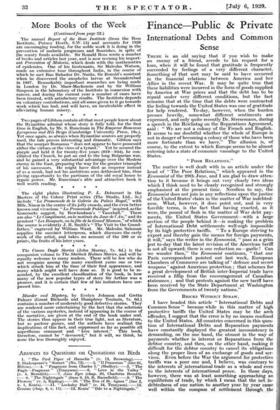' Two pages of Gibbon contain all that most people
know about the Byzantine admiral whose story is fully told, for the first time in English, by Mr. S. Runciman in The Emperor Roman= Lecapenus and His Reign (Cambridge University Press, 16s.). Vet once again, as always when Byzantine sources are properly used, the tale proves interesting and dramatic. Gibbon says that the usurper Romanus " does not appear to have possessed either the virtues or the vices of a tyrant. Yet he secured the purple and held it for twenty-five years (919-944), he con- eiliated the Church, he put an end to the long Bulgarian war, and he gained a very substantial advantage over the Moslem enemy in the East, preparing the way for the greater triumphs Of his successors. He might have died as emperor instead of as a monk, had not his ambitious sons dethroned him, thus giving opportunity to the partisans of the old royal house to regain power. Mr. Runcirnan's able and attractive book is well worth reading.
* * * *










































 Previous page
Previous page